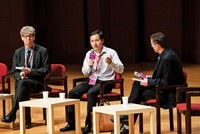Advertisement
Grab your lab coat. Let's get started
Welcome!
Welcome!
Create an account below to get 6 C&EN articles per month, receive newsletters and more - all free.
It seems this is your first time logging in online. Please enter the following information to continue.
As an ACS member you automatically get access to this site. All we need is few more details to create your reading experience.
Not you? Sign in with a different account.
Not you? Sign in with a different account.
ERROR 1
ERROR 1
ERROR 2
ERROR 2
ERROR 2
ERROR 2
ERROR 2
Password and Confirm password must match.
If you have an ACS member number, please enter it here so we can link this account to your membership. (optional)
ERROR 2
ACS values your privacy. By submitting your information, you are gaining access to C&EN and subscribing to our weekly newsletter. We use the information you provide to make your reading experience better, and we will never sell your data to third party members.
Ethics
Gene-edited embryos should not be implanted for pregnancy, international commission says
More research is needed to ensure the safety of heritable genome changes
by Jyllian Kemsley
September 3, 2020
| A version of this story appeared in
Volume 98, Issue 34
Genome-editing science has not advanced to the point at which human embryos with edited genes should be used for pregnancy, according to a Sept. 3 report by the International Commission on the Clinical Use of Human Germline Genome Editing.
Changes to embryo genomes can be passed into reproductive cells and consequently inherited by offspring. For that to be done safely in humans, researchers must demonstrate that targeted embryo genes are edited correctly in all cells, without affecting nontargeted DNA, and that the gene changes will not affect development, the report says.
The commission was created after news broke in 2018 about the birth of twin girls whose embryos were edited in an attempt to make them resistant to HIV infection. The effort to create the babies was led by He Jiankui, then at the Southern University of Science and Technology. Chinese authorities subsequently sentenced He to 3 years in prison and a ¥3 million ($440,000) fine, China’s state media agency, Xinhua, reported.
The US National Academy of Medicine, US National Academy of Sciences, and the UK Royal Society convened the commission. It consisted of 18 members representing 10 countries and the fields of “genome editing technology; human genetics and genomics; psychology; reproductive, pediatric, and adult medicine; regulatory science; bioethics; and international law,” according to a news release. The commission’s job was to develop “a framework for scientists, clinicians, and regulatory authorities to consider when assessing potential clinical applications of heritable human genome editing,” its report says.
To that end, the report focuses on laying out what it calls a responsible pathway from research to clinical use of heritable human genome editing. The first component of that pathway is to limit heritable genome editing to serious diseases—defined as ones that result in severe symptoms or premature death—caused by mutations in a single gene. Examples of such diseases include sickle cell and cystic fibrosis.
“Should they ever be used, it is vitally important that these technologies are used for medically justified interventions, based on a rigorous understanding of how the pathogenic variant leads to disease,” commission cochair Kay Davies, a professor of genetics at the MDUK Oxford Neuromuscular Centre, says in a statement. “International cooperation and open discussion of all aspects of genome editing will be essential.”
A separate group, the World Health Organization Expert Advisory Committee on Developing Global Standards for Governance and Oversight of Human Genome Editing, is charged with recommending governance mechanisms for human genome editing. That committee’s work is ongoing. One of its first efforts was to create a registry for clinical trials using human genome-editing technologies.



Join the conversation
Contact the reporter
Submit a Letter to the Editor for publication
Engage with us on Twitter